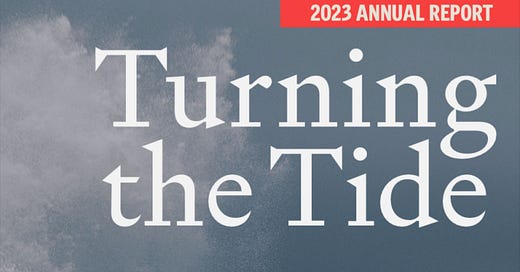A Thumb on the Scale of Domestic Innovation
As panic sets in across North American business communities, populist economists suggest politicians pause to reflect on the usefulness of tit-for-tat retaliatory tariffs.
There’s still 2 days to go before we find out if our industries will be dramatically disrupted by new Canada-U.S. tariffs, and few reasons to believe they won’t go ahead. As North America’s fresh produce suppliers are drained of their labor force; industrial hog barns contemplate closing down; and grain bids disappear… it’s time to look for alternatives.
U.S. economist Oren Cass founded the policy advisory American Compass, and appears to be leading the Republican party away from its blind trust in free markets. A thought-provoking CBC interview today pointed to American cities gutted by free trade, leaving behind all the frustrated and unhappy people that support the current administration.
The mission of these tariffs is to displace cheap imports with a re-industrialized manufacturing and resource base in the U.S., and to reap downstream economic strength. Fans of this policy call it ‘putting a thumb on the scale of domestic innovation,’ while opponents beg them to ‘take their thumbs off the scale and let private businesses compete.’
This report describes in plain language all the rationale behind these tariffs, which are no joke nor easily-reversed. Canadian politicians need to get really brave, while affected business owners must change course.
Make America Make Things Again
Cass describes global supply chains and their beneficiaries as ‘an ossified status quo that has been allowed to settle into place, and no matter whether it’s good or bad, no one will touch it.’ In some cases, he believes the right way to break them up is with a sharp, painful shake.
Since the intention of this administration is to reset the economic playing field, pain is inevitable. Dramatic action is expected to mitigate the long-term transition costs of disrupting global trade and reversing the outcomes it has had on American society.
As panic sets in across North American business communities, this champion of populist economics suggests politicians pause to reflect on the usefulness of tit-for-tat retaliatory actions, and consider instead a U.S. foreign policy approach that does not stand up for its allies. Everyone knows Canada has no clout compared to the U.S. in a trade war, and has already started beefing up border security in response to Trump’s early demands.
What’s harder to fathom are the food and agriculture policy changes that will probably be necessary, eventually, to entice the U.S. to negotiate. Compromising supply management would have been political death in Canada in the past, but now, maybe putting it on the table could save other industries.
Keep reading with a 7-day free trial
Subscribe to Prairie Routes Research to keep reading this post and get 7 days of free access to the full post archives.




